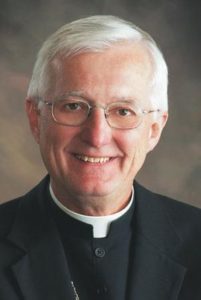By Barb Arland-Fye

Among topics he and his fellow bishops discussed at last week’s spring meeting, Bishop Martin Amos said he was especially concerned with reports on challenges to religious freedom nationally and internationally.
“Personally, I found reports on both domestic and international religious freedom to be very sobering,” the bishop said June 18. During the meeting in Atlanta he heard a plea for help from Chaldean Auxiliary Bishop Shlemon Warduni of Baghdad concerning Iraq’s dwindling, persecuted Christian population and reports from several speakers on curtailment of religious freedom in the U.S.
On the domestic front, “the government is trying to define who we are as a Church. That’s entering into the internal structure of the Church,” Bishop Amos said. He referred to a U.S. Conference of Catholic Bishops’ statement on religious liberty that cites examples of religious liberty under attack:
• The U.S. Health and Human Services contraceptive mandate that requires many religious employers to provide insurance coverage that covers contraceptives, sterilization and drugs that can induce abortion.
• Immigration laws in some states that forbid what the government deems to be harboring of undocumented immigrants and what the Church deems to be Christian charity and pastoral care to those immigrants.
• A proposed bill in the Connecticut legislature that would have forced restructuring of Catholic parishes.
• The denial of student organization status to a Christian Legal Society at a California law school because the society required its leaders to be Christian and to abstain from sexual activity outside of marriage.
• Catholic foster care and adoption services in several states that went out of business because Catholic Charities refused to place children with same-sex couples or unmarried opposite-sex couples who cohabit.
These and other challenges to religious freedom “affect the autonomous working of the Church. We should define who we are, not the government,” Bishop Amos said.
The bishop also listened with interest to a 10-year report from the National Review Board on the Charter for the Protection of Children and Young People. That document responded to the clergy abuse scandal that emerged in 2002.
Bishop Amos said he will present both the 10-year report and the National Review Board’s recommendation to the Davenport Diocese’s Review Board at its next meeting in early July. The recommendations cover education of clergy, laity and the community at large; prevention efforts; oversight and accountability. The bishop noted that the diocese practices transparency in its dealings with the Review Board.
Also during the bishops’ spring meeting Carolyn Woo, the new director of Catholic Relief Services (CRS), gave an overview of that organization which Bishop Amos found impressive. CRS is the official relief and development agency of the USCCB. It not only responds to catastrophes, but stays for the long haul to help victims become self-sufficient, the bishop said.
In other business, the bishops agreed to move ahead with a draft of a message on work and the economy as a way to address poverty and the struggles unemployed people are experiencing. The bishops also called for using new forms of media to reach people in their everyday lives as part of the new evangelization. In keeping with that effort, the USCCB has posted the Catechism of the Catholic Church on line, which visitors can view free of charge.
Bishop Amos also noted that a uniform translation of the New American Bible and the lectionary are planned so that people will be using the same translation for personal prayer, catechesis and liturgy.







